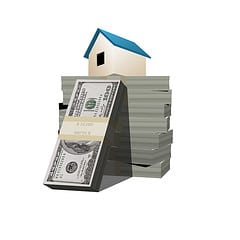Last updated July 12, 2018.
When you file for bankruptcy, the bankruptcy court steps between you and your creditors. Bankruptcy laws are meant to give you some breathing room, providing you a fresh start or some time to reorganize your finances. The law protects you from your creditors while you do that, but that doesn’t necessarily mean you can stop paying your mortgage.
In short, if you want to keep your home through your bankruptcy, you’ll have to keep making mortgage payments.
The Automatic Stay

As far as your mortgage is concerned, the automatic stay will prevent foreclosure. You just have to file before the home is sold. Even if the auction is already scheduled, you can stop the sale by filing for bankruptcy.
The automatic stay is powerful, but creditors can request that it be lifted. If you stop making mortgage payments, the bank may ask the court to lift the stay. If the court agrees to do so, the bank can continue on with the foreclosure process.
Keeping Your Home
When you file for bankruptcy, you’ll need to decide whether you want to keep your home or not. If not, you can stop making mortgage payments. The bank will typically request a lift of the stay and move on to sell your home. If your home were foreclosed outside of bankruptcy and sold for less than it’s worth, you may be liable for the difference, which is called a “deficiency.” However, if you’ve completed the bankruptcy process, you won’t be liable for the deficiency.
If you do want to keep your home, the process depends on which type of bankruptcy you choose to file. Consumers typically file under either Chapter 7 or Chapter 13.
Chapter 7 Bankruptcy and Mortgages
Under Chapter 7, you’ll surrender your non-exempt assets (in most cases we can exempt everything you own) and the bankruptcy trustee will sell them. The proceeds will go to your creditors. At the end of the process, your leftover unsecured debts will be discharged.
California offers two different sets of exemptions to protect your assets. Under System 1, between $75,000 and $175,000 of equity in your home is exempt. Under System 2, up to $26,800 of equity in your home is exempt. Note that these exemptions apply to equity – the amount of your home that you own outright. If you borrowed $200,000 to purchase your home and still owe $150,000, then you have $50,000 of equity.
If your home equity is not covered by the exemptions, you won’t be able to keep it. If your home equity is covered by the exemptions, you’ll be able to keep it as long as you continue to make payments. You may be required to “reaffirm” the mortgage debt. A mortgage reaffirmation is simply a reiteration of your original promise to pay. If you reaffirm a debt (like a mortgage or car title loan), that debt cannot be discharged in a later bankruptcy.
Chapter 13 Bankruptcy and Mortgages
Under Chapter 13, you’ll work with your attorney and the bankruptcy trustee to create a payment plan that will last 3 to 5 years. At the end of that period, your remaining unsecured debts will be discharged. If you want to keep your home, you can include your Chapter 13 mortgage payments in the plan. You can use your Chapter 13 plan to catch up on mortgage arrears, too. Like in a Chapter 7 bankruptcy, you may be required to enter a mortgage reaffirmation agreement.
See also: California Bankruptcy Court Announces New Home Loan Modification Program
The bottom line: Whether you file under Chapter 7 or Chapter 13, you’ll have to continue making mortgage payments if you want to keep your home.
Other Mortgages and Home Equity Lines of Credit
The situation is somewhat different if you have taken out other loans against your home. Generally, you won’t be able to discharge second mortgages or home equity loans in Chapter 7 if you want to keep your home. You may be able to discharge a second mortgage or home equity line of credit in Chapter 13 if your home is underwater – if you owe more than it’s worth. Whether or not a court will wipe out your second mortgage depends on the particular judge and your particular circumstances.
What should you do?
If you’re struggling with mortgage debt, you should think carefully about whether you want to keep your home. In some cases, it may be best to surrender it to the bank. If your home is underwater, bankruptcy can protect you from liability for any deficiency after the foreclosure process.
If you want to keep your home, you’ll need to determine whether you’ll be able to keep making mortgage payments after bankruptcy. (Remember, bankruptcy can wipe out your other debts, so you’ll have more cash to make mortgage payments.) If you have arrearages, Chapter 13 mortgage payments can help you repay them.
The prospect of losing your home is difficult and upsetting. Contact us online or come in for a free consultation with one of our experienced bankruptcy attorneys. We’ll go over your finances with you and help you determine the best way to deal with your debt.
Image Credit and License
